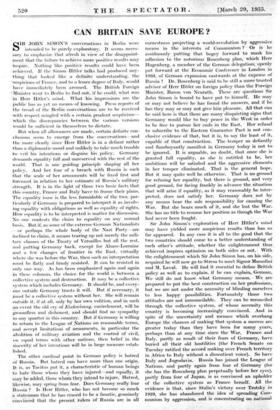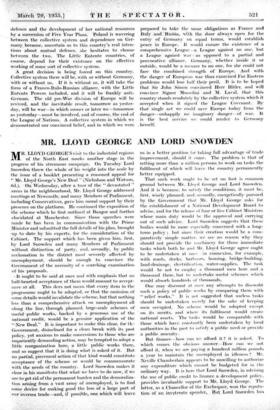CAN BRITAIN SAVE EUROPE ?
SIR JOHN SIMON'S conversations in Berlin were intended to be purely exploratory. It seems neces- sary to emphasize that afresh in view of the disappoint- ment that the failure to achieve more poSitive results may 'inspire. Nothing like positive results could have been achieved. If the Simon-Hitler talks had produced any- • thing. that looked like a definite understanding, the 'suspicions of France, and to a lesser degree of Italy, would have immediately been aroused. The British Foreign -'31inister went to Berlin to find out, if he could, what was in Herr Hitler's mind. What his impressions are the public has as yet no means of knowing. Press reports of the trend of the Berlin conveliations 'are to be received with respect mingled with a certain prudent seepticism- - Which • the discrepancies between the various versions would he sufficient in themselves to dictate.
But when all allowances are made, certain definite con- clusions seem to emerge from the conversations—and the more clearly since -Herr Hitler is- in a defiant rather than a diplomatic mood, and unlikely to take much trouble to veil his intentions or disguise his policy. Germany demands equality full and unreserved with the rest of the world. That is one guiding .principle shaping all her policy. And her fear of a breach with Russia is such that the scale of her armaments will be fixed first and foremost in relation to her estimate of Russia's military strength. It is in the light of those two basic facts that this country, France and Italy'have to frame their plans. The equality issue is the less formidable of the two, par- ticularly if Germany is prepared to interpret it as involv- ing equality with obligations as well as equality of rights. How equality is to be interpreted is matter for discussion. No one contests the claim to equality on any normal basis. But if, as some of the extreme German Nationalists --or perhaps the whole body of the Nazi Party—are inclined to claim, it means tearing up not merely the mili- tary clauses of the Treaty of Versailles but all the rest, and putting Germany back, except for Alsace-Lorraine and a few changes of frontier in the East, virtually where she was before the War, then such an interpretation must be flatly and firmly resisted. It can be resisted in only one way. As has been emphasized again and again in these columns, the choice for the world is between a collective system and destruction. It may be a collective system which includes Germany. It-should be, and every- One outside Germany trusts it will. But if necessary, it Must be a collective system without her. She will remain Outside it if at all, only by her own volition, and in such an event the old cry of Einkreisupg, encirclement, will be groundless' and dishonest, and should find no sympathy in any quarter in this country. But if Gertnany is willing .to return to the League of Nations on reasonable terms, and accept limitation's of armaments, in particular the abolition of military aviation and the control of civil, on equal terms with other nations, then belief 'in the sincerity of her intentions will be in large measure estab- lished.
The other cardinal point in German policy is hatred Of -Russia. But hatred can have more than one origin.
It is, as Tacitus put it, a characteristic of human beings to hate those whom they have injnred—and equally, it May be added, those whom they intend to injure. Hatred, likeWise, may spring from fear. Does Germany really fear RUssia ? Is Herr Hitler, who has not become so much statesman that he has ceased to be a fanatic, genuinely *convinced that the present -idlers of Russia'are in all earnestness projecting 'a world-revolution by aggressive means in the • interests of Communism ? Or is' he assiduously putting that bogey forward to mask his , adhesion to the notorious Rosenberg plan, which Herr Hugenberg, a member of the German delegation.,•-openly put forward at the Economit Conference in London in 1933, of German expansion eastwards at the expense of Russia ? Dr. Rosenberg is Said to be still a more trusted adviser of Herr Hitler on foreign policy than the Foreign Minister, Baron von Neurath. These are questions Sir John Simon is bound to have put to himself. He may or may not believe he has found the answers, and if be has they may or may not give hiin. pleasure. All that can be said here is that there are many'disquieting signs that Germany would like to buy peace in the West; in order to be free to pursue her ends in the East. - Her refusal to subscribe to the Eastern Guarantee Pact is not con- clusive evidence of that, but it is, to say the least of it, capable of that construction. - The -temper so defiantly and flamboyantly manifest in Germany today is not to be ignored. It is arguable, no doubt, that once' she is granted full equality, as she is entitled to be, her ambitions will be satisfied and the aggressive elements in her temper eliminated. That is the general hope. But it may quite well be otherwise. That is no ground for refusing her equality, but there is ground, and very good ground, for facing frankly in advance the situation that will arise if equality, as it may reasonably -be inter- preted, does mot satisfy her. Germany does not by any means bear the sole responsibility for causing the War. But she bears much of it, and she lost the War. She has no title to resume her position as though the War had never been fought. , - Sir John Simon's exploration of Herr Hitler's mind may have yielded more auspicious results -than has so far appeared. In any case it -is all to the good that the two countries should come to a better understanding of each other's attitude, whether the enlightenment thus, achieved inspires optimism on both sides or mot.- With the enlightenment which Sir John Simon has, on his. side, acquired he will now go to Stresa to meet Signor. Mussolini and M. Laval. He will find it essential to define British policy as well as to explain, if he can explain, :German. We still do not know what Germany means. We are prepared to put the best construction on her professions, but we are not under the necessity of blinding ourselves to less happy possibilities. Fortunately those two attitudes are not irreconcilable. They can be reconciled through the collective system, of whose necessity this country is becoming increasingly convinced. And in spite of the uncertainty and menace which overhang Europe the chances of making that system a success are greater today than they have been for many years, perhaps than at any time since the War. France and Italy, partly as result -of their fears of Germany, have buried all -their old hostilities (the) French Senate on Tuesday ratified the accord making over French territory in Africa to Italy without a dissentient voice). So have Italy and Jugoslavia: Russia has joined the League of Nations, and partly again from fear of Germany (for she has the Rosenberg plan perpetually before her eyes), partly from fear of Japan, is as convinced an upholder of the collective system as France herself. All the evidence is that, since Stalin's victory over. Trotsky in 1928, she- has abandoned the idea of spreading Com- munism by aggression, and is concentrating on -national defence and the development of her national resources by a succession of Five Year Plans.- 'Poland is wavering between the collective system and dependence on Ger- , many, because, uncertain as to this, country's real inten- tions abotit mutual defence, she hesitates to choose between the two. The Little Entente countries, of -Course, depend for their existence on the effective working of some sort of collective system.
A great decision is being forced on this country. Collective system there will be, with or without Germany, with or without us. If it is without us, it will take the form of a France4talo-Russian alliance, with the Little Entente Powers included, and it will be frankly anti- German. The old pre-War division of Europe will be revived, and the inevitable result, tomorrow as yester- day, will be war—in which sooner or later we—tomorrow as -yesterday—must be involved, and of course, the end of the League of Nations. A collective system.in which we demonstrated our convinced belief, and in which we were prepared. to take the same obligations as France and Italy :and :Rasia, viith the door always open for the entry of Germany on equal terms, would establish peace in- Europe. It would ensure the existence of a comprehensive League—a League against no one, but a League against war—as opposed to a partial and provocative alliance. Germany, whether inside it or outside, would be a menace to no one, for she could not face the combined strength of Europe. And with the danger of European war thus exorcized Far Eastern problems would lose half their peril. It is to be hoped that Sir John Simon convinced Herr Hitler, and will convince Signor Mussolini and M. Levi!, that this country stands resolutely by the collective system which it accepted when it signed the League Covenant. By that single act we could save Europe today from the danger—unhappily no imaginary danger—of war. It is the best service we could render to Germany herself.







































 Previous page
Previous page